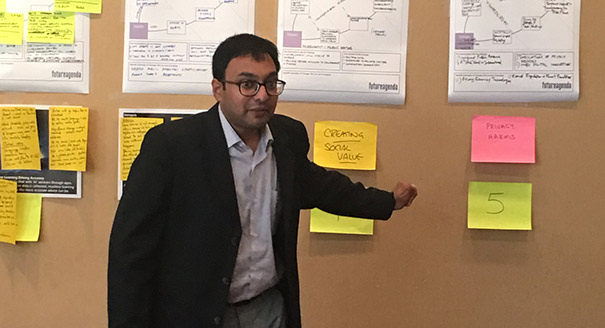Registration
Thank you!
You will receive an email confirming your registration.
The centrality of data for both innovation and policymaking renders data governance a critical theme for technology and policy discourse. At Carnegie India’s recently concluded 2017 Global Technology Summit, the issue of data governance was mentioned in various panels, including technology in governance, sustainable mobility, smart cities, and modern biotechnology. Carnegie India, in partnership with Future Agenda, held a workshop on the future value of data and the factors that may influence it.
Discussion Highlights
- Data Sovereignty: Given the difficulty of ensuring in-country data storage and processing, participants agreed that calls for greater localization of data will be a major challenge in the near future. They generally agreed that geopolitical and jurisdictional issues will continue to complicate the governance of data across national boundaries, and that a solution on this front needs to be found. However, they also felt that localization may offer more problems than solutions, particularly for start-ups who end up incurring higher server costs when locating them in India. Participants also noted that conflicts between nations due to data transfer issues will lead to the development of international legal instruments to regulate such activities. Participants anticipated the potential establishment of a World Data Council to govern such international data transfer issues in the future.
- Artificial Intelligence and Machine Learning: Participants noted that major advances in artificial intelligence technologies will significantly impact the governance and value of data. Nations that grow adept at employing such technologies could leapfrog their competitors, they said.
- Data Ethics: Apart from regulations, participants noted the potential for industry standards and other ethical frameworks to guide data use and accountability.
- Creating Social Value: Discussants asserted that, if utilized properly and particularly with greater coordination between the public and private sectors, data can help citizens in their day-to-day activities.
- Privacy Harms: Participants stressed that the definition of privacy violations is constantly evolving. They discussed a variety of ways that such violations can occur, including identity theft, discrimination and profiling, and collective harm to society. Participants recommended guarding against such dangers by having a greater focus on harm-based regulation and the concept of ‘Privacy by Design’—the practice of building in privacy protections throughout the software and technology development process, including lesser data gathering at the outset and limited permissions to access only those features central to the functioning of the app or software solution.
